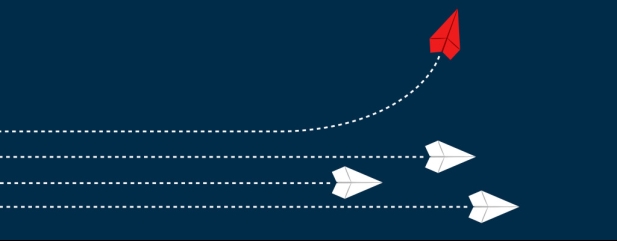Archived article
Please note that tax, investment, pension and ISA rules can change and the information and any views contained in this article may now be inaccurate.
Welcome to the third ‘sea change’ for investment markets in 50 years, says expert

It’s fair to say that 2022 will go down in history as the year where investors’ portfolios were turned on their head. Many things that worked in the previous decade have become a drag on performance, most notably the large declines seen across mega cap US stocks including a 60% decline in Tesla (TSLA:NASDAQ) and a 48% drop in Amazon (AMZN:NASDAQ).
Rather than being a long-overdue market correction, some experts believe the investment landscape has just experienced a large structural change. This could require an overhaul of your investment portfolio.
Howard Marks from Oaktree suggests we’re experiencing the third major sea change for investment markets of the last 50 years. He says: ‘We’ve gone from the low-return world of 2009-21 to a full-return world, and it may become more so in the near term. Investors can now potentially get solid returns from credit instruments, meaning they no longer have to rely as heavily on riskier investments to achieve their overall return targets.’
Marks adds: ‘If you grant that the environment is and may continue to be very different from what it was over the last 13 years – and most of the last 40 years – it should follow that the investment strategies that worked best over those periods may not be the ones that outperform in the years ahead. That’s the sea change I’m talking about.’
Between 2009 and 2021, interest rates were very low which made it easy for companies to borrow money to grow. Now it’s more expensive to borrow and lenders – be it through loans or bonds – or investors through share placings are less willing to back loss-making businesses or ones with minimal prospects for decent profits near-term.
Just look at Trackwise Designs (TWD:AIM) which was on the verge of running out of cash and only secured an equity fundraise by issuing new shares at an incredible 92% discount to the market value. Existing investors have been battered.
Aside from companies in financial trouble, the other area of the market to reconsider if held in your portfolio is expensive growth stocks. While most will have already seen a derating over the past year, I fear these types of stocks will remain out of fashion for some time.
In an era where interest rates could stay higher for longer, why would an investor want to pay 40-plus times earnings for a business offering the promise of disruption, innovation and transformation when they can find plenty of companies on less than half that rating that are already profitable and growing? There will be the odd exception where it is worth paying up, but for most it will be hard going to win back the market’s favour.
Managers of growth funds can be excused one year’s bad performance, but next year they’ll have to prove to investors that more attention is being paid to valuation and that they are actively seeking better value opportunities now they’ve lost the tailwind which previously fuelled the growth bandwagon.
We’ll explore these issues in Shares over the coming months. Until then, I would like to wish every reader a Merry Christmas and a Happy New Year. We’ll be back on 12 January 2023.
Important information:
These articles are provided by Shares magazine which is published by AJ Bell Media, a part of AJ Bell. Shares is not written by AJ Bell.
Shares is provided for your general information and use and is not a personal recommendation to invest. It is not intended to be relied upon by you in making or not making any investment decisions. The investments referred to in these articles will not be suitable for all investors. If in doubt please seek appropriate independent financial advice.
Investors acting on the information in these articles do so at their own risk and AJ Bell Media and its staff do not accept liability for losses suffered by investors as a result of their investment decisions.
Issue contents
Feature
- Cerillion’s share price is up 729% in five years: here’s why
- Tate & Lyle, London Stock Exchange and Jet2 shine in our 2022 stock picks
- How it went wrong for Amazon and what comes next
- Greggs: we reveal the secrets of its success and plans for the future
- The story behind the month’s big earnings upgrades
- The reasons why fund managers changed their mind on certain stocks in 2022
- Emerging markets: Views from the experts
- Revealed: the best and worst performing emerging markets in 2022
Great Ideas
- 2023 stock pick: JD Sports Fashion – a great business at the wrong price
- 2023 stock pick: Apple’s shares have become cheaper and it remains a cash-generating giant
- 2023 stock pick: GSK is cheap versus peers and is finally going places
- 2023 stock pick: It could be gold’s year and miner Shanta is a great way to play it
- 2023 stock pick: Premier Foods is looking tasty thanks to booming cake and sauce sales
- 2023 stock pick: Compass is an outsourcing winner with underappreciated growth potential
- 2023 stock pick: ME Group is a resilient, high quality business
- 2023 stock pick: Prudential could be the low-risk way to play China’s reopening
- 2023 stock pick: Walt Disney is ready for a big comeback under Bob Iger
- 2023 stock pick: ASML is set for bumper revenue and earnings growth
News
- Luxury firm Lanvin looks unloved as shares fall 28.5% following market debut
- Ukraine and rates: why the market’s two big bugbears are not going anywhere
- Why Marlowe shares have collapsed despite strong half-year results
- Why Victorian Plumbing shares have rallied 120% in three months
- Could the tobacco industry become extinct after radical new legislation?
- Games Workshop shares hit 11-month high on Amazon licensing deal

 magazine
magazine








